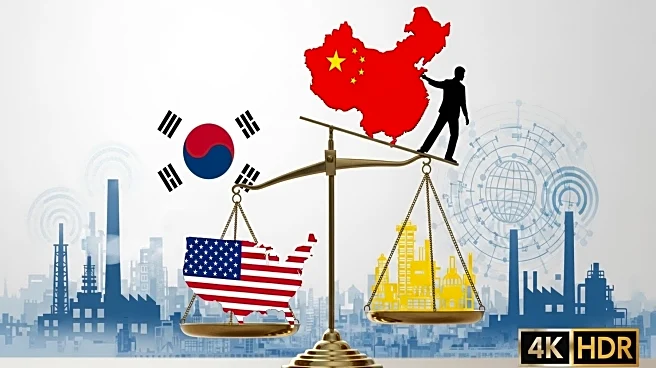What is the story about?
What's Happening?
The ongoing trade conflict between the United States and China has intensified, with significant repercussions for Korean industries. The Chinese Ministry of Commerce recently announced tighter export controls on rare earth metals, crucial for manufacturing semiconductor equipment, electric vehicle motors, and batteries. This move is part of a broader tit-for-tat economic retaliation between the two countries, which is seen as a strategy to strengthen bargaining positions ahead of a potential summit in Korea. Korean companies, particularly in the chip, auto, and shipping sectors, are concerned about long-term production setbacks due to potential delays in export approvals from China. In response, the U.S. Trade Representative's office has decided to impose maritime-related fees on foreign-built vehicle carriers and liquefied natural gas vessels, further escalating tensions. These fees are expected to impact Korean shipping firms like Hyundai Glovis, which primarily transports vehicles produced by Hyundai Motor and Kia.
Why It's Important?
The escalation in U.S.-China trade tensions poses significant risks to Korean industries, which are heavily reliant on rare earth metals for production. The new export controls by China could lead to supply chain disruptions, affecting the manufacturing of semiconductors and electric vehicles. Additionally, the U.S. maritime fees could increase operational costs for Korean shipping companies, potentially leading to financial losses. The broader impact on the global economy is also notable, as the trade conflict contributes to market volatility, evidenced by the recent plunge in U.S. stock indices. The situation underscores the interconnectedness of global trade and the potential for geopolitical disputes to affect economic stability across multiple countries.
What's Next?
As tensions continue to rise, stakeholders are closely monitoring the situation for any signs of reconciliation between the U.S. and China, particularly at the upcoming Asia-Pacific Economic Cooperation (APEC) summit. The possibility of a meeting between President Trump and Chinese President Xi Jinping could offer a platform for negotiation and de-escalation. Meanwhile, Korean companies are preparing countermeasures to mitigate the impact of the trade conflict, including discussions with global shipping firms and clients to enhance operational efficiency. The outcome of these diplomatic and business efforts will be crucial in determining the future trajectory of the trade relationship and its impact on affected industries.
Beyond the Headlines
The trade conflict highlights the strategic importance of rare earth metals in global manufacturing and the leverage they provide in international negotiations. The situation also raises ethical and legal questions about the use of trade policies as tools for geopolitical influence. Long-term shifts in supply chain strategies may occur as companies seek to diversify sources of critical materials to reduce dependency on any single country. Additionally, the conflict may prompt discussions on the need for international frameworks to manage trade disputes and ensure fair practices.
















